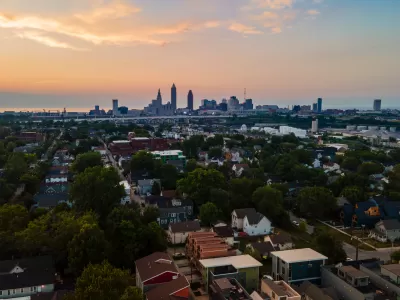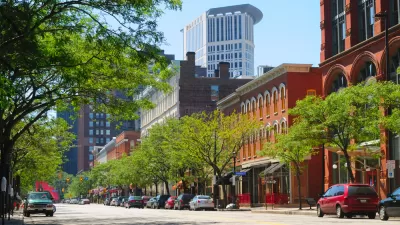If passed by the city council, the new form-based code will be piloted in four neighborhoods.

Cleveland’s planning commission approved new form-based code language and maps last week — after six years of planning and a decade of discussions. It marks the first fundamental change to the city’s zoning code since 1929. “The form-based code is a pilot project, an initiative funded by $275,000 in public money and grants,” reports Michelle Jarboe for News 5 Cleveland. If passed by the City Council,it will initially apply to four areas of the city, with the potential to expand citywide in the years to come.
Many Clevelanders have long considered the city’s current, traditional zoning code to be broken.
According to Jarboe, variances are routine, “whether someone’s adding a deck to a bungalow or building an apartment complex,” but navigating the approval process takes time, money, and knowledge, ultimately discouraging development. Officials hope the more straight-forward form-based code and simpler processes will encourage investment across the city and allow more city residents to establish home-based businesses, which current zoning laws discourage. The new form-based code will also allow more types of homes, including three- and four-unit projects, tiny houses, backyard apartments, and cluster homes, Jarboe reports.
Shannan Leonard, the chief city planner who led the code-reform effort, told News 5 Cleveland that the overall goal is to make zoning more digestible and to better reflect residents’ desires. “We really want to rely on more straightforward, 21st century language, as well as photos and graphics to kind of help people along … We want to be more equitable … We want to be more sustainable. We want to be healthier. And all of those things are wrapped up into zoning,” Leonard said.
FULL STORY: Cleveland Planning Commission OKs major zoning change after a decade of discussions

Planetizen Federal Action Tracker
A weekly monitor of how Trump’s orders and actions are impacting planners and planning in America.

San Francisco's School District Spent $105M To Build Affordable Housing for Teachers — And That's Just the Beginning
SFUSD joins a growing list of school districts using their land holdings to address housing affordability challenges faced by their own employees.

The Tiny, Adorable $7,000 Car Turning Japan Onto EVs
The single seat Mibot charges from a regular plug as quickly as an iPad, and is about half the price of an average EV.

Seattle's Plan for Adopting Driverless Cars
Equity, safety, accessibility and affordability are front of mind as the city prepares for robotaxis and other autonomous vehicles.

As Trump Phases Out FEMA, Is It Time to Flee the Floodplains?
With less federal funding available for disaster relief efforts, the need to relocate at-risk communities is more urgent than ever.

With Protected Lanes, 460% More People Commute by Bike
For those needing more ammo, more data proving what we already knew is here.
Urban Design for Planners 1: Software Tools
This six-course series explores essential urban design concepts using open source software and equips planners with the tools they need to participate fully in the urban design process.
Planning for Universal Design
Learn the tools for implementing Universal Design in planning regulations.
Smith Gee Studio
City of Charlotte
City of Camden Redevelopment Agency
City of Astoria
Transportation Research & Education Center (TREC) at Portland State University
US High Speed Rail Association
City of Camden Redevelopment Agency
Municipality of Princeton (NJ)




























